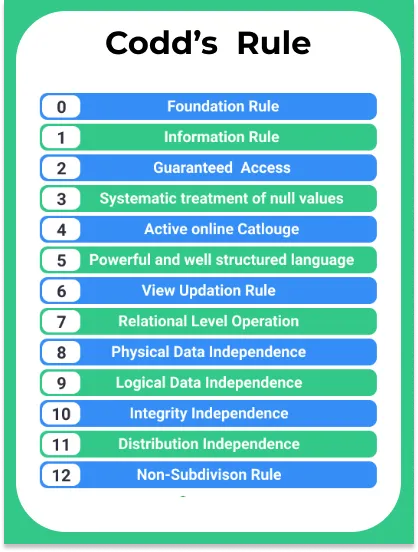0
Notifications Mark All Read
No New notification
- Login
- Get Prime
EF Codd’s Rules in DBMS
EF Codd’s Rules
On this page, we will learn about EF Codd’s Rules in DBMS.
EF Codd’s rules in DBMS
- EF Codd is a computer scientist who first outlined the relational model which now became the most popular and one and only database model
- Codd Proposed
13 rules(listed from 0 to 12) popularly known as codd’s 12 rules which are used as a yardstick to test the quality of relational database management system(RDBMS) - Till now none of the commercial product has followed all the 13 rules even Oracle has followed 8.5 out of 13

Rule 0: Foundation rule
- If a system is said to be an RDBMS then the database should be managed using only relational capabilities
Rule 1: Information rule
- All the data including metadata must be stored in some cell of the table in the form of rows and columns .
Rule 2: Guaranteed access
- Each data element in a table must be accessed through a combination of table name + primary key (row)+ attribute(column)
- Example : emp+empid+ename,sal
- Strictly the data must not be accessed via a pointer .
Rule 3: Systematic treatment of null values
- Null values represent different situations it may be missing data or not applicable or no value situation.
- Null values must be handled consistently and also primary key must not be null and any expression on null must give null.
Rule 4: Active online catalog
- Database dictionary is a catalog which shows structural description of the complete database and it must be stored online
- This rule states that a database dictionary must be governed by the same rules and same query language as used for general database.
Rule 5: Powerful and well-structured language
- The database should be accessible through a language which supports definition, manipulation and all transaction management activities, such a language is called structured language
- For example, SQL, if database uses a different language for data access and manipulation then it is a violation of the rule.
Rule 6: View updation rule
- Difference views created for different purposes should be automatically updated by the system itself.
Rule 7: Relational level operation
- Operations like insert, delete and update operations must be supported at each level of relation even though it might be a nested relation or a complex relation
- Set operations like union, intersection, minus must be supported.
Rule 8: Physical data independence
- Any change in the physical location of the table should not reflect the change at the application level
- Example: If you rename or move a file from one disk to another then it should not affect the application.
Rule 9: Logical data independence
- If there are any changes done to the logical structure of the database table, then users view of data should not be changed
- If the table is split into two tables, then a new view should give result as the join of these two tables but this rule is very difficult to satisfy.
Rule 10: Integrity independence
- Database table should design itself on integrity rather than using external programs.
- It should use primary keys, check constants triggers, etc which makes our DBMS independent of the front end application.
Rule 11: Distribution Independence
- Data distribution over various geographical locations over a network should not reflect the end-user i.e you should feel that all the data is stored in a single place
- This rule laid the foundation for the distributed database.
Rule 12: Non-Subversion Rule
- Any access given to the data that is present in the lowest level must not give a chance to authenticate constraints and change data ,this can be achieved through some kind of encryption techniques.
Prime Course Trailer
Related Banners
Get PrepInsta Prime & get Access to all 200+ courses offered by PrepInsta in One Subscription
Get over 200+ course One Subscription
Courses like AI/ML, Cloud Computing, Ethical Hacking, C, C++, Java, Python, DSA (All Languages), Competitive Coding (All Languages), TCS, Infosys, Wipro, Amazon, DBMS, SQL and others

 0
0


Login/Signup to comment